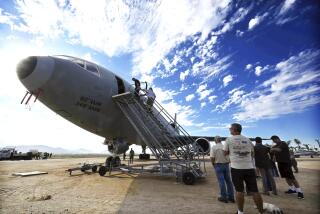Cubans Gleeful, U.S. Transcript of Attack Shows
- Share via
WASHINGTON — U.N. Ambassador Madeleine Albright released a chilling transcript Tuesday as evidence that Cuban military pilots fired with unabashed glee at the small planes that flew into a danger zone near Cuba on Saturday.
The transcript, presumably collected by U.S. military intelligence and translated from Spanish, reveals that the pilots knew the planes were civilian Cessnas before firing missiles and downing two of the three aircraft piloted by Cuban exiles.
In its most dramatic moments, the transcript--which U.S. officials say report the words of the pilots of a Cuban MIG-23 and a MIG-29 and of Cuban ground control--shows that ground control told the pilots four times that they were “authorized to destroy” the planes.
The MIG-23 pilot described one plane as a “white and blue small aircraft, at a low altitude, a small aircraft.” And before the MIG-29 pilot told ground control that “I’m going to fire at it,” he identified his target as “a Cessna 337,” the aircraft flown by the Cuban exile group Brothers to the Rescue.
After the shoot-down, one of the pilots said: “This one won’t mess around anymore.”
Albright told a news conference at the United Nations: “I was struck by the joy of these pilots in committing coldblooded murder.”
Albright released the transcript after the U.N. Security Council, in a predawn meeting Tuesday, said it “strongly deplores” the destruction of the civilian aircraft by the Cuban air force and called on the International Civil Aviation Organization to investigate the incident.
That organization in 1983 adopted an amendment to its convention that rules out “the use of weapons against civil aircraft in flight.”
The provision was adopted by all states, including Cuba and the United States, although it is not in force because many governments have not ratified it--including Havana and Washington.
The council’s stance Tuesday came in the form of a statement approved unanimously by the 15 members and read in strong tones by Albright, council president for the month of February.
Such a statement, which lacks the legal force of a resolution, is issued only when it meets the approval of all the ambassadors. To win this support, Albright had to water down the statement. The Clinton administration had proposed a stronger document.
The Security Council accepted the U.S. contention that states are required by international law to refrain from firing on civilian aircraft. But the U.S. failure to win a stronger statement evidently reflected the lack of sympathy in the United Nations for the U.S. trade embargo against Cuba and for U.S. attempts to isolate the island.
The transcript released by Albright states that, after the first missile was fired, the MIG-29 pilot shouted, “We took out his balls.”
MIG-23 pilot: “Wait, wait, look and see where it fell. . . .”
MIG-29 pilot: “Mark the place where we took it out.”
MIG-23 pilot: “This one won’t mess around anymore.”
After releasing the transcripts, Albright said, “Frankly, this is not cojones. This is cowardice.”
The vulgar Spanish word cojones, which means testicles, is usually used to connote bravery or manhood, and the pilots were presumably using the Spanish word where the transcript says “balls.”
Cuban Foreign Minister Roberto Robaina Gonzalez late Tuesday called for a special session of the 185-member U.N. General Assembly, saying the United States rushed the Security Council into action before he arrived to plead Cuba’s case.
The minister said he could not get to New York before the council issued its statement because his U.S. visa from Denmark, where he was visiting, was delayed.
In Havana, Robaina’s ministry reacted angrily to the U.N. censure and President Clinton’s announcement Monday of a series of measures, including suspension of charter flights between Havana and Miami, designed to punish President Fidel Castro’s government.
“There is no reason to sanction Cuba,” the Foreign Ministry statement declared. “Nevertheless, the unfair and cruel measure advocated by President Clinton seems like little to the representatives of the ultra-right in the United States who, in asking for severe sanctions, have done nothing more than contribute to making American policy more crude.”
The suspension of charter flights left Cuban Americans scrambling from terminal to terminal at a chaotic Havana airport trying to find flights home, wire agencies reported.
Meanwhile, Cuban exiles in Miami said Tuesday that they plan to send boats and two more aircraft into international waters and skies off Cuba.
“Those are international waters. Nobody can prevent us by fear,” said Jose Basulto, leader of Brothers to the Rescue, the exile organization, and the pilot of the Cessna that was not shot down Saturday.
The transcript released Tuesday made clear that Basulto was advised by Cuba that his planes were courting danger.
Basulto identified himself and his organization and told Havana air control that his planes were crossing the 24th Parallel between Florida and Cuba to operate north of Havana. Although Brothers to the Rescue was organized to spot escaping Cubans in danger in the Caribbean, it has previously penetrated Cuban airspace and dropped leaflets attacking Castro.
According to the transcript, Havana told Basulto: “Sir, be informed that the zone north of Havana is activated. [One word unintelligible] you, danger behind 24th Parallel.”
Basulto replied: “We are aware that we are in danger each time we cross the area to the south of the 24th, but we are willing to do it as free Cubans.”
The transcript does not make clear whether the planes were over Cuban territorial waters when shot down. The Clinton administration has acknowledged that Basulto’s plane did penetrate Cuban airspace but has insisted that the two downed Cessnas did not.
Times staff writer Juanita Darling contributed to this report from Havana.
More to Read
Sign up for Essential California
The most important California stories and recommendations in your inbox every morning.
You may occasionally receive promotional content from the Los Angeles Times.













